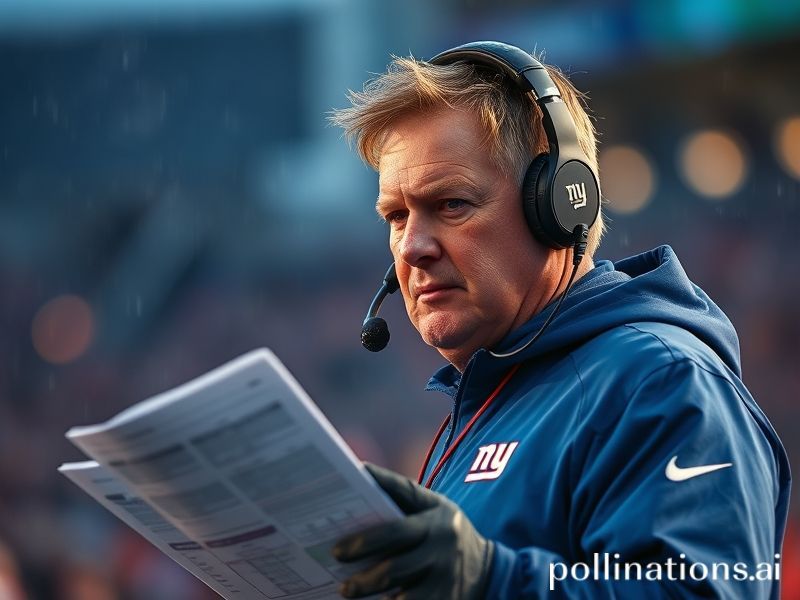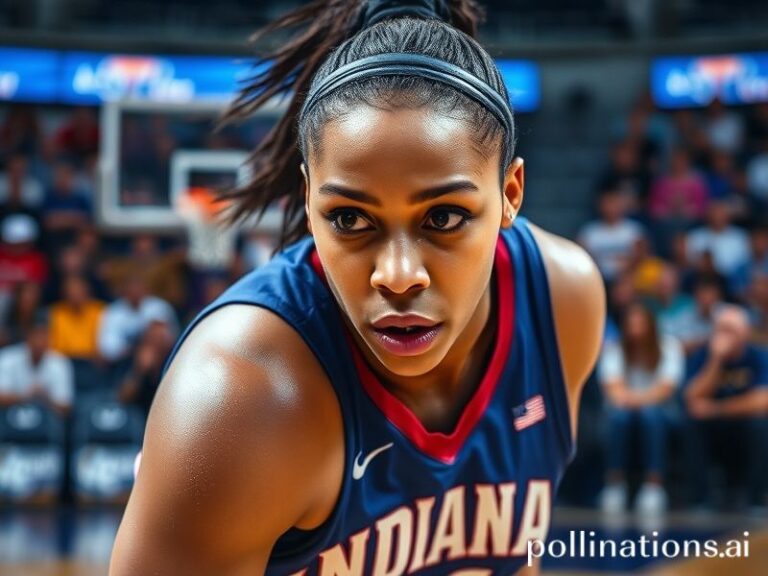Mike Kafka: The NFL’s Global Metaphor for Merit, Metrics, and Managed Chaos
Mike Kafka: The Quarterback Whisperer Who Refused to Yell “Fire” in a Crowded Theater
By Our Man in the Cheap Seats, somewhere between Reykjavík and regret
If you squint at the NFL hard enough, it starts to look like the United Nations with shoulder pads: every autumn, billionaires in luxury boxes vote on the future of young men from places like Lubbock and Lagos, while the rest of the planet tunes in for the commercials. Into this pageant of soft-power diplomacy steps Mike Kafka—yes, that’s his real surname, the one destiny handed him like a Kafkaesque joke—currently the offensive coordinator of the New York Giants and, depending on which talk-radio tribunal you consult, either the next boy-genius head coach or the latest over-promoted intern who will be ritually disemboweled on talk shows by Thanksgiving.
Kafka’s ascent is being watched in places far beyond the five boroughs. In Seoul, insomniac finance brokers streaming Game Pass see him as proof that middle managers can still leap continents of nepotism. In Nairobi sports bars, patrons argue whether his RPO-heavy playbook is colonially complicated or just American baroque. Meanwhile, European soccer coaches—already spooked by how American analytics ate their lunch in the Champions League—fear NFL ideas will migrate overseas and ruin their beautiful game the same way Starbucks ruined Italian espresso: efficiently, with optional oat milk.
The international fascination isn’t really about Kafka’s biography (suburban Chicago kid, Northwestern philosophy major, four career starts in a forgettable 2010 season). It’s about what he represents: the last meritocratic escalator left in a world where most escalators are broken, on fire, or privatized by oligarchs. In an era when 30-year-olds still live with parents from Milan to Mumbai, Kafka jumped from lowly QC coach to play-caller in six years, proving that if you grind film long enough you can still vault classes—provided you’re six-foot-three, can throw a 50-yard post, and don’t mind traumatic brain injury as a retirement plan.
Over in Davos, they aren’t discussing Mike Kafka—at least not overtly. But the metrics that minted him are the same algorithms coming for your job, whether you pack fish in Reykjavík or underwrite derivatives in Zurich. NFL teams now hoover up PhDs who speak Python instead of Pashto; the same code that diagrams Cover-3 beats is being repurposed to diagram consumer behavior, voting blocs, and, soon, your daily emotional temperature. Kafka is merely the friendly face on the surveillance apparatus, the hoodie-clad salesman assuring us that if the playbook is smart enough, maybe nobody has to get hurt—except, well, the occasional quarterback who holds the ball 2.7 seconds too long.
The darker joke, of course, is that Kafka’s promotion coincides with the Giants’ offense resembling a centrally planned economy: lavish resources, puzzling shortages, and periodic five-year plans that end in punt. Fans in Buenos Aires who’ve lived through sovereign-default déjà vu recognize the pattern—great expectations, greater debt, and a currency (in this case, quarterback Daniel Jones) that never quite stabilizes. If the whole experiment implodes, the international lesson will be typically American: fail up, collect a buyout, and get hired somewhere sunnier. Tampa’s nice this time of collapse.
Still, there’s something almost heartwarming in watching a planet battered by plague, inflation, and TikTok diplomacy gather around laptops at 3 a.m. to argue about whether a third-and-seven mesh concept will work against the Cowboys. It suggests that, despite everything, humans still crave the same tidy narrative: a snap, a read, a throw, a result. Binary. Clean. Hope in 40-second intervals.
So here’s to Mike Kafka, the accidental statesman of our fractured century, calling plays that double as geopolitical metaphors. Win or lose, he reminds us that the globe’s real lingua franca isn’t English or Mandarin—it’s play-action, baby, and we’re all just waiting to see if the safety bites. If the tight end pops open over the middle, maybe—just maybe—the world holds together for one more commercial break. If not, there’s always next season, or next civilization, whichever comes first.







